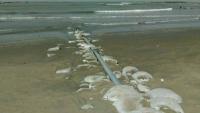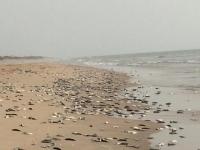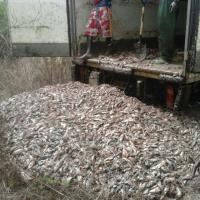(JollofNews) – The odour is unmistakable, the stench is unavoidable, fish price skyrocket, frustrations abound, Bro you don’t know the extent to which our patience has been exercised, said Mr Bojang.
I intimated, Bro, stench and odour is the same and Mr Bojang sighed with a deep breath to collect himself. Imagine someone come to your compound, dump sewage, put herbicide on your lawn and throw some cyanide into your well, how will you feel. I said definitely that will trigger war. He went on, what is more frustrating is; the Chinese have the audacity to threaten us, and frustrating still, they are exploiting our own brethren to perpetrate their odious crime against our environment and fish resources for only fifty cents. These our brethren have no conscience and only care about their pockets at the detriment of our community and environment. I said hmmm this is ugly business and definitely it’s time to show the Chinese who the boss is.
Mr Bojang went on, Mr Darboe can you imagine a Gambian doing this sort of stuff in China or India. Chinese and Indians who kill black folks just for dating their girls. We put the government in power to protect our livelihood, our environment and resources but the former government colluded with some notable Gunjurians to establish this Chinese factory on our pristine beach which is our heritage and great source of tourist attraction; is being systematically destroyed by Chinese with excuse of providing local employment.
The former Yaya government has no respect for the will of the people and certainly no respect for the environment or our local beaches. Yaya plus local henchmen have been a continuing sources of despair for Gunjur, first he usurped it’s Kenyekenye Jameng area, fence it with high walls and allowed this notorious Chinese company to rape our fish resources, pollute the beaches and gas us with this foul stench which we don’t actually know what type of gas it is.
Fair enough I have heard it all. This issue cannot be brush aside any more, it has to be brought the attention of the new administration to take urgent action.
The fracas about the Chinese company started barely some two years ago and the fish factory as was superficiality named was initially slated as manufacturing plant for fertilizer production but unknowing to the generality of Gunjur citizenry, was a plant for manufacturing fish products in form of pellets for Chinese market.
It’s products still shrouded in secrecy is sent to China in packages and even the local workforce don’t actually know the complete production process. There are certain stages according some staffs which only the Chinese know. Also there are certain areas of the plant which is restricted, a no go area for the local Gunjur staffs according sources familiar with the workings of the plant.
The whole process was established without proper consultation with local stakeholders and if local grapevine is to be trusted, it’s only the chief, the alkali and some village authorities who were in the know of the full extent of this notorious Chinese enterprise. The name of some local big fish, a prominent businessman surfaced as the mastermind of the plant.
According to sources the plant was purportedly setup for fertilizer manufacture but a month into the process people noticed dumping of unwanted fish on the beaches, on road sides and places proximal to dwellings. Chinese normally build local infrastructure when they set up plants like this to attract local empathy and support; they build roads and sometimes hospitals. However in this case they ignored our people’s aspirations and invited no input from them since they knew that they have Yaya government’s backing as well some local power brokers in their pocket. Power brokers who can easily sell their land and sea resources for a dime.
The road to the beach plied by their heavy lorries and vans is in disrepair and cannot cater for such a high volume of traffic. It is a feeder road made of gravel which Yaya ignored even though he has been frequenting the place to visit Kenyekenye Jameng.
Simply because Gunjurians have inconsequential political clout in his calculations or out of pure disdain. For years our people have been silent bystanders out of fear of their lives, hopelessly acquiesced. Just as in many part of Gambia, Jammeh’s pervasive dominance of the political, economic and social life of the Gambians citizenry has haply been challenged. He succeeded systematically in dividing the people and inserting his loyal enablers in form of local power brokers and NIA to intimidate and coalesced people to submission.
Gunjur was no exception and this has led to the current imbroglio which has so far prove perilous to not only to the environment and sea resources but to the standard of living of our people. As Tuklor Sey eloquently put it, Gunjur’s environmental ruination by the Chinese is a national challenge because that sea once was a honey comb for many Gambians. The Gunjur catfish with its distinctive taste and Gunjur smoked fish used to be an excellent source of protein for many towns villages from Kombo to Basse. Since Yaya government came in, Gunjur’s pre-eminence in fish production dwindled to near extinction and Tangi took over.
Gunjur is a prolific settlement to a diversity of tribes and people from Gambians regions; it’s widely acclaimed reputation as the most welcoming town to people from many areas in the Gambia as well as the sub-region. It’s one of the few prominent Mandinka dominated towns where people will give their daughter in marriage to foreigners without much attention to the backgrounds of the spouse in contradistinction to many other towns in the Gambia.
In many towns, especially in Baddibu, they want to know your background first, especially, to authenticate whether you are of a Karanke, or Jali background before they decide to offer you spouse. In some places even grave yards exhibits people status in life, a distinction of Fooro and Jongo, not in Gunjur the town of scholars of distinction and pre-eminence, in the person of Bun Jeng and Hatab Bojang; not to forget Kombo Sillah the king and emir of Kombo. Not to be distracted from the burning issue at hand, the people of Gunjur deserve more.
It provided the sand mining which generated huge cash flows for the country for decades yet the local infrastructure benefited nothing from those resources and it has been documented that Yaya Jammeh solely monopolized those cash flows at the detriment of our environment. Just as Kartong beach was close to decimation, so was Gunjur yet the denizens sheepishly acquiesce out of fear of persecution by Jammeh henchmen.
The Chinese fishing methods fall below international standards and is very destructive to fish resources. They will soon deplete our fish resources because the type of net they use does not discriminate between the fish species they need and the type they don’t need. That’s why they dispose the unwanted fish to the dismay of the local populations who find it expensive to buy local Chalo.
The local fishermen cannot compete with a well resourced and technologically advance fishing equipment that the Chinese deploy and therefore the local industry is slowly shrinking with consequential loss of revenue and standard of living.
Our environment is a sacred heritage which we shall protect with blood and sweat come what may and the current government’s sluggish and apparently insignificant efforts despised our contributions in enthroning their candidate who happen to be the majority leader in parliament.
Perhaps now the issue has been thrust to the fore-front of national discourse some urgent action will be taken to address the situation. It has been grapevine news that the environment minister who is purportedly out-of-town will visit the location once he returns.
The Chinese must either have to put their act together, stop this senseless rape of our environment and sea resources or they totally close down. If the government failed to prevail on them which we hope not, we will not hesitate to unleash local activism which may germinate some unintended consequences.
The saddest and most disappointing aspect that bedevil this episode is the collusion of our own brethren out of sheer opportunism and ignorance. Th Chinese may be gone but Gunjur stays and recriminations may make it difficult to look at folks in the eye. SALAM
By Lamin Darboe
Leicester,UK




Gambia: Barrow Intervenes In Gunjur Pollution Saga
Jollof Media Network, 31.05.2017
(JollofNews) – President Adama Barrow of the Gambia has accused a Gambian based Chinese-owned fishing factory at the centre of severe online criticisms of breaking the country’s environmental regulations.
Golden Leaf Factory in the coastal fishing village of Gunjur, Kombo South, is accused of releasing intense bad odour which is making people sick as well as destroying the country’s fish reserves and polluting the waters.
The management of the factory has denied the allegations which it described as untrue.
But the president said a recent fact-finding mission to the factory by his government’s officials has found that the factory has not respected proper environmental requirements as they are expected to under correct waste management and disposal practices.
Writing on his Facebook page, Mr Barrow wrote: “I have followed developments relating to the environmental pollution of some of our coastal villages in the Gambia, particularly in the area of Gunjur Beach. My government officials have visited the Golden Lead Company in Gunjur and have concluded that the company has not respected proper environmental requirements as they are expected to under correct waste management and disposal practices.
It has also been brought to my attention that there has been some illegal fishing in the area, with some fishermen using the wrong equipment. This is resulting in the catching and dumping of juvenile fish along the beach.”
Mr Barrow said while his government encourages and welcomes investment in the Gambia to promote the country’s economic growth and development, it maintains a firm position about protecting the environment and public health.
“Business practices must be environmentally friendly. We shall take all necessary action to ensure that current and future economic operators in the Gambia abide by the code of conduct expected of them,” he added.